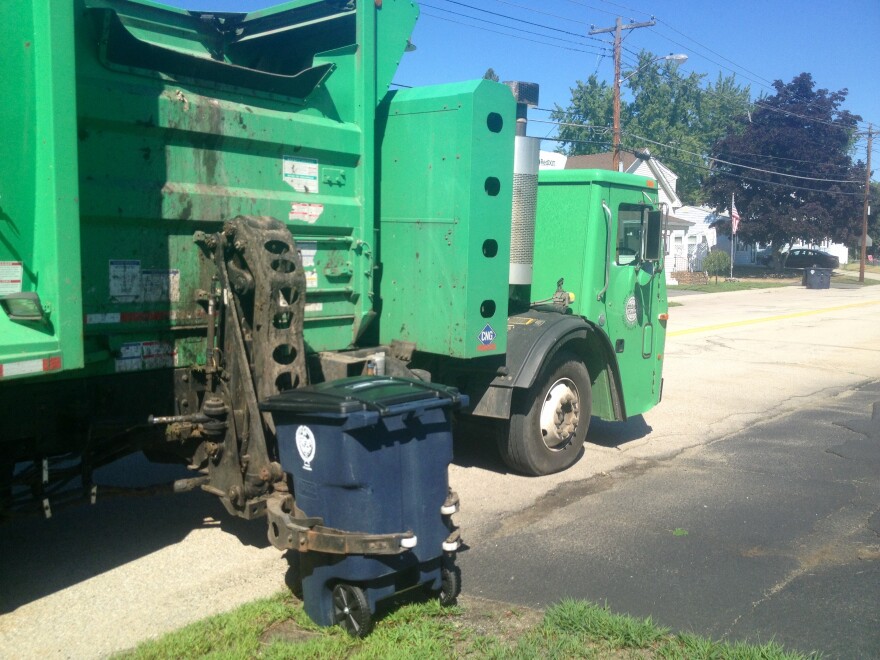Beginning next spring, Manchester residents in the northwestern and eastern parts of the city will switch to automated trash pickup. That’s after city officials decided this month to launch a pilot program with trucks that use a mechanical arm to pick up garbage.
But this idea is nothing new - in fact Nashua has been using it for 13 years.
Nashua’s solid waste supervisor, Jeff Lefleur, started out working on trucks as a trash collector. He said when the city rolled out its new automated trucks he was a big fan.
“I know myself when I was on the back of a truck it was rain, snow, sleet, whatever so when I got the chance to jump into an automated truck where I am in an air conditioned truck, no rain, no sleet, no snow – I loved it,” Lefleur recounted.
Lefleur said automated garbage trucks can pick up twice as much trash in the same amount of time as the old manual ones, and that’s completely changed the job.
“When the trucks are out on the route it takes about an 8 second cycle for the arm to come out, grab the barrel and dump the barrel into the truck," Lefleur said. "Where as if you had a person on the back, the person has to get off the truck, grab the barrel, wheel it over to the truck, hook it up to the truck, dump it, lower the barrel back down, drag it back over to the side of the curb.”

Nashua has six automated trucks out on city streets every weekday. The trucks are manned by a single driver. How it works is this: There’s an automated arm that comes down, grabs the cart, empties it and places it back down on the ground.
Thirteen years ago the city paid $2 million to switch to automation - that included the cost of buying the new trucks and all the trash toters for the residents.
But Nashua is not alone. Moving to automation is common. For instance across the border in Massachusetts several cities such as Lynn, Fall River to Springfield have made the switch.
And beginning next spring, automated trash pickup will begin in parts of Manchester. Residents in Wards 6, 7 and 12 are part of a pilot program—something ward 12 alderman Keith Hirschmann said is needed because the current system creates a mess.
“Squirrels get into it, things happen, someone drives over it, people plow the streets and snowbanks end up on trash bags, all kinds of calamities happening and these bags ripped open – I’m seeing it,” Hirschmann said.
Hirschmann proposed the pilot program which requires residents to purchase specialized trash toters at $65 to $75 per barrel. But the city has agreed to pick up half the tab. And officials say many residents in these wards already have these specialized bins that the city has been selling for years.
"I know myself when I was on the back of a truck it was rain, snow, sleet, whatever so when I got the chance to jump into an automated truck where I am in an air conditioned truck, no rain, no sleet, no snow - I loved it," said Nashua's Solid Waste Supervisor Jeff Lefleur.
Once automated trash collection starts up, residents will no longer be able to leave their trash on the ground. And driving around Nashua with Kevin Naro, who manages the city’s trash collectors, you’ll notice that right away.
“The city is definitely cleaner – just the fact of not having the trash all over the ground and the animals tearing it up," Naro said. "In the winter time with the snow, now it’s a matter of them moving the toter out of the way and not bags and bags of trash getting buried in the snowbanks, you know.”
And for drivers in Nashua like Mike Cole, who was a trash collector before the city switched over to automation, he said the jobs now much easier.
It’s also saved him a lot of wear and tear on Cole’s overall body.
“You have a guy on the back you pull up to four or five barrels of yard waste – one barrel can weigh 10 pounds, one barrel can weigh 80 pounds and you don’t know until you grab it," Cole said. "And when you grab it to pull it up to the truck – there is a lot of force right there and if you expect it to be 20 or 30 pounds and its 80 or 100 you’re pulling a muscle if not pulling your back.”

And that’s been one of the major driver’s behind Manchester’s piloted program: preventing injuries on the job. Manchester's environmental programs manager Mark Gomez said on average the city pays $300,000 annually for workers’ compensation claims just for trash collectors and loses 4,500 hours per year.
But with automation, also comes fewer city jobs for trash collectors. But Gomez said all the city’s current trash collectors will be reassigned within the department at their same salary or higher to fill roles such as:
“Litter collection in parks, we’d like to do that a little bit more, we’d like to clear sidewalks during snowstorms sooner than we do," Gomez said. "We’d also like to do more compliance around illegal dumping and finally we’d like to be able to fill potholes and pave roads faster and we think we can do all that those things with the personnel made available through automation.”
And if the pilot program is successful, Manchester may soon have automated trash pick-up in all of the city’s less congested areas.


